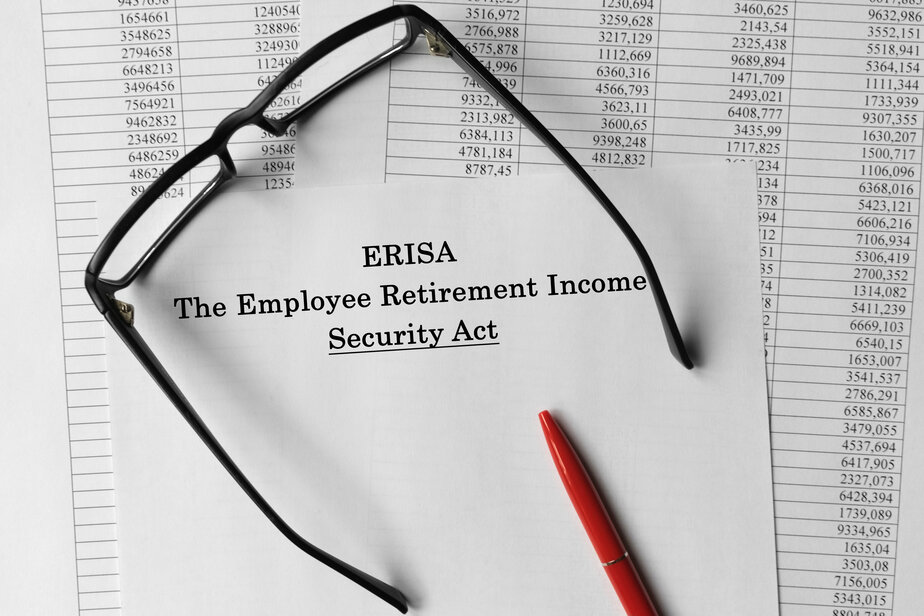Table of Contents
What is ERISA?
ERISA is an acronym for the Employee Retirement Income Security Act, a law passed by Congress in 1974 aimed at protecting the rights of employees who participate in their employers’ benefit plans and their dependents. ERISA applies to a host of employee benefits – pensions, 401k and 403b plans, disability, health, and life benefits, along with severance and other benefits administered by employers.
ERISA applies to the private sector and does not encompass state, federal, or municipal employers, although it may apply to government employee benefit claims if the benefits are provided by a labor organization. Another significant exemption is “church plans,” which are benefits sponsored by religious organizations.
What is an ERISA Claim?
Any claim for benefits brought under a private sector or union sponsored employee benefit program is an ERISA claim.
How Can I Determine My Rights to Bring an ERISA Claim?
Federal law requires that employers provide employees with a summary plan description that provides information about claims and how to go about submitting a claim for benefits, along with deadlines for submitting claims.
How Do I File an ERISA Claim?
Different types of claims have different claim procedures. Human resources personnel should be able to explain the process. Here are some specifics as to different types of claims:
Retirement – Depending on the nature of the claim (i.e., pension or 401k), the employee needs to complete a set of forms specifying how and to whom benefits are to be paid. The election is usually irrevocable, so the employee should understand and make sure they are making the correct election, which may require assistance from a financial advisor. If the employee is married, any election other than a joint and survivor annuity, such as choosing a lump sum distribution of retirement funds, requires spousal consent.
Disability – There are three parts to a disability claim – the employee statement, the employer statement, and the attending physician statement. The employee describes their impairment and lists their treating doctors on the employee statement, the employer lists dates of employment, salary and job duties on its statement, and the attending physician needs to certify disability. Employees should not start the disability application process without being sure they have support from their treating doctor.
Health Benefits– Most health benefit claims are routine and are submitted directly by the doctor or hospital. However, claims that require pre-approval or claims involving highly expensive services such as newly developed drugs or certain medical devices, and many types of behavioral health treatment may require a letter of medical necessity from the treating doctor before approval. Claimants should make sure that their physicians are ready and willing to back up their claims. With certain pharmaceuticals and medical devices, the manufacturer may be able to provide resources.
Life Insurance/Accidental Death Insurance – In most instances, all that is necessary to complete an application for benefits is proof of beneficiary designation, a copy of the official death certificate, and completion of a form listing name, address, and other demographic information from the claimant. However, if an autopsy was performed, it can be useful to have a copy of the report available prior to submitting a claim. Or in accidental situations where there was law enforcement involvement, such as a fatal car accident, it would be advisable to obtain a copy of the police report.
What Happens After the Claim is Submitted
The claim will be reviewed by the insurance company or designated benefits personnel. Depending on the nature of the claim, there are deadlines imposed by the U.S. Department of Labor for rendering a claim decision. Delays may occur if the insurer or benefit administrator needs to gather additional evidence such as medical records, police reports, and medical examiner/coroner evidence
What Happens if the Claim is Denied?
If a claim denial is issued, claimants are usually obligated to submit an appeal with the benefit plan administrator as a precondition to challenging the denial in court. Many types of claims have very short time deadlines for appeals such as health insurance claims classified as “urgent,” i.e., where the patient’s life is in jeopardy or the patient is in severe pain. Appeal deadlines in such matters can be as short as three days
ERISA claim appeals can be very complex. The U.S. Department of Labor has issued a comprehensive set of regulations addressing ERISA claims and appeals. ERISA appeals are a legal procedure and often require an attorney’s assistance to navigate through the complex ERISA appeal process. An experienced and knowledgeable attorney will know how to handle the appeal by gathering the necessary additional evidence that may be required and to present a winning argument to overturn an unjustified denial. Another reason to get an attorney involved early in the appeal process is that if the appeal is unsuccessful, a court may not consider new evidence, so the failure to get an attorney involved until after an appeal is denied could prove to be fatal to recovering benefits later.
Deadlines for appeals are critical. Submitting an appeal even one day late could result in a loss of benefits that cannot later be challenged in court.
Once the appeal is submitted, the claim decision can generally take up to 90 days. For disability claims, if the insurer or benefit administrator obtains evidence during the appeal that is adverse to the claimant, that evidence must be shared and the claimant given an opportunity to comment before the appeal decision is rendered.
What if the Appeal is Denied?
If the appeal is denied, the next step is to bring a lawsuit. Because ERISA is a federal law, most ERISA benefit cases are heard in federal court, although state courts also have jurisdiction if both sides agree to keep the case there. Court rulings have determined that jury trials are not available in ERISA cases; and other procedures differ in ERISA cases from other types of litigation. For example, most courts put limits on “discovery” in ERISA cases, meaning that depositions and other types of information gathering that typically takes place in civil lawsuits is curtailed.
As mentioned above, there may also not be an opportunity to submit new or additional evidence in court. Once the appeal is completed, most court render a verdict based exclusively on the record assembled during the course of the claim and ensuing appeal.
ERISA litigation may take months to years depending on the judge and how quickly the case progresses. While some cases are decided following bench trials, in most circumstances, the cases are decided by a court reviewing the claim record and addressing arguments presented by each side without the court hearing witness testimony.
In ERISA litigation, it is possible in some instances to convince a court that the denial was mistaken but the claimant still loses. This occurs where the court applies a judicial standard of review known as the abuse of discretion or arbitrary and capricious standard. If that paradigm applies, and its application depends on language contained in the policy that signals the insurance company had “discretion” to decide the matter, the denial decision is presumed correct and will be overturned only if it is found “unreasonable,” a daunting standard for claimants to meet. That is why it is so important for claimants to make sure they are represented by experienced and knowledgeable counsel who have handled similar cases and know how to present the most favorable arguments. If the litigation is successful, the court may, but does not necessarily have to, award attorneys’ fees to the claimant in addition to accrued benefits. Fees are not recoverable, though, at the claim appeal stage.
ERISA claims are often very complex and difficult. Finding an experienced and knowledgeable ERISA claim lawyer early in the claim process is often the ticket to success.







